by Shadi Hamid
What does it look like to come of age in the Muslim Brotherhood, to find yourself skipping classes and revolting against the state? In an organization that prioritized the principle of “listening and obeying,” how did Muslim Brotherhood youth decide enough was enough and start questioning not just the decisions of their leaders, but some of Muslim Brotherhood’s most basic assumptions about violence and political change?
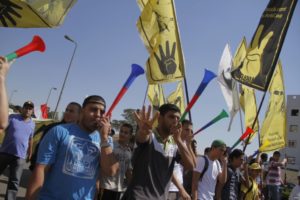
The story of one of these activists— I’ll call him Karim— reflects a journey that has become all the more common. These are young men and women who grew up in the Muslim Brotherhood’s embrace, dedicating their lives to the movement. But a series of unlikely events— the revolution, Morsi’s rise to the presidency, then a coup, followed by a massacre— led them, however slowly, from certainty to doubt.
Their commitment to the Muslim Brotherhood is so deep— the Muslim Brotherhood after all is not so much an organization as a way of life— that they would never think seriously of leaving. But they questioned nearly everything else: tactics, strategy, and even what it meant to believe in and fight for an Islamic state. For the twenty- three- year- old Karim, a dentistry student, the shock started the day of the coup.
“It was June twenty-eighth,” he recalled. “I was in Rabaa, and a Muslim Brotherhood official was talking to us, telling us not to worry, that ‘the army is in our pocket.’ Great. I believed them because I didn’t have the information to come up with a different opinion. That’s why when the coup happened, it was such a big shock.”
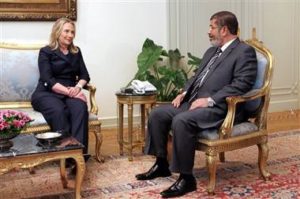
Karim generally agreed with the Rabaa sit-in, but the surrounding circumstances worried him. “I started to have questions,” he recalled. “Okay, what if they came in and hit us? Then we’ll defend ourselves, but we don’t have anything to defend ourselves with. If so, then we’re just offering ourselves for death.” Despite his doubts, there wasn’t a protest he would miss in those few first months after Rabaa.
But what he described as the Muslim Brotherhood leadership’s “radical peacefulness” continued to grate on him. “Your job is to get killed and that’s it,” he told me. “I don’t want violence, but at the same time I don’t want that kind of peacefulness. So if we let them kill us and we lose two hundred thousand people, okay, and then what? He has no compunction to kill. Nothing will stop him, except if the people he’s killing can resist.” In early 2014, he was arrested. It was an ordinary day (to the extent that life on the run can be ordinary).
Karim joined a protest, as he always did after the weekly Friday prayer. He was, by now, fairly skilled at this sort of thing, having attended protests at least weekly, sometimes daily, though his enthusiasm was starting to wane. This time, when the police came, his friends were able to get away, but he found himself surrounded on both sides by officers. He laughed and then told me, “I was the only one who got arrested!”
Even in the best of times, Egyptian prisons are notorious for their subhuman conditions. These were not the best of times. There were thirty people in a small cell, probably not much larger than four by six meters. The prisoners couldn’t sleep on their backs, only on their side. “You can’t even spread your legs out or else you’ll end up hitting someone,” Karim recalled, his voice steady and reflective, as if remembering a field trip gone awry. There were ten Muslim Brotherhood members. The rest were also political prisoners of various sorts, most of whom had been rounded up at street protests. The Muslim Brotherhood assumed leadership of the cell, offering religious classes to the other prisoners on the Quran and the life of the Prophet Mohamed.
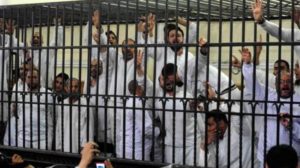
It was ideal for recruitment. You had thirty people in close quarters, together twenty- four hours a day. There was nothing to do but talk to everyone else about everything— religion, politics, tactics, and strategy. Three months and three weeks into his four- month prison stint, he was moved to another prison unit. This is where Karim’s evolution would continue, his doubts heavier than before.
In a neighboring cell, there was a charismatic Salafi preacher named Ahmed Ashoush. After returning from the anti- Soviet jihad in Afghanistan, Sheikh Ahmed Ashoush spent nineteen years in prison, from 1992 until the start of the Arab Spring. Ahmed Ashoush was an unrepentant Salafi jihadi. Before the coup, Ahmed Ashoush had gained modest recognition in the Egyptian press as a “controversial” and open critic of Morsi and the Brotherhood. In a 2012 talk show appearance, he described Morsi as an “illegitimate” president. Morsi, Ahmed Ashoush added, was no different from the other Egyptian presidents that came before him— even if he happened to be a more observant Muslim.
Ahmed Ashoush instead called for a true Muslim ruler to run a true Islamic state. The prison guards would open the cells for about ten minutes, and Karim would sneak off to Ahmed Ashoush’s cell and stay there the rest of the day. He only had four days with the sheikh, but he made the most of it, spending every waking hour with him. Before his arrest, Ahmed Ashoush had memorized dozens of The Muslim Brotherhood books.
He spent much of his nineteen years in prison going over the details in his head, making sure he didn’t forget a thing. This was also how he stayed sane. “[Ahmed Ashoush] was just so knowledgeable that he was able to influence me to an extraordinary degree,” Karim told me. Ahmed Ashoush challenged him on the ideological origins of the Brotherhood, linking Banna to Jamal al- Din al- Afghani and Mohamed Abduh. He viewed the two leading Islamic modernists as dangerous innovators who had fallen under the allure and influence of Western colonialism. Not only that, they were murtadeen, or apostates.
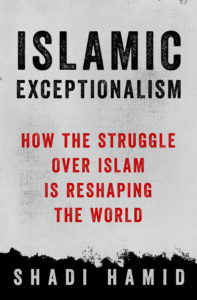 Ahmed Ashoush challenged his eager student on the Muslim Brotherhood’s 2012 constitution. “Morsi’s constitution is far from the ideas of establishing sharia and Islam,” Karim recalled the sheikh saying. “I wasn’t able to say much in response because he was telling me things I didn’t know in the first place.” In just a few days with Sheikh Ahmed Ashoush, the doubts began to gather. One of Karim’s friends, who joined our conversation at the coffee shop, jumped in. “With Muslim Brotherhood youth,” he said, “ there is a deficit of religious education. We weren’t raised well intellectually. So when we sit with people like Sheikh Ahmed Ashoush and hear big talk, about this book and that book, naturally we’re overwhelmed.”
Ahmed Ashoush challenged his eager student on the Muslim Brotherhood’s 2012 constitution. “Morsi’s constitution is far from the ideas of establishing sharia and Islam,” Karim recalled the sheikh saying. “I wasn’t able to say much in response because he was telling me things I didn’t know in the first place.” In just a few days with Sheikh Ahmed Ashoush, the doubts began to gather. One of Karim’s friends, who joined our conversation at the coffee shop, jumped in. “With Muslim Brotherhood youth,” he said, “ there is a deficit of religious education. We weren’t raised well intellectually. So when we sit with people like Sheikh Ahmed Ashoush and hear big talk, about this book and that book, naturally we’re overwhelmed.”
Contrary to popular perception, Salafi’s are at least in some ways more theologically sophisticated than their counter parts in the Muslim Brotherhood. For reasons inherent to their particular brand of Islamism, theology isn’t as important for Brotherhood- inspired groups. This is why Salafi’s like Ahmed Ashoush tend to look at the Muslim Brotherhood with suspicion: Because of their modernist pedigree, they’re too flexible, too pragmatic, and too willing to use sweeping maslaha (public interest) arguments to justify or rationalize what are ultimately political imperatives.
Karim was lucky that his sentence was short. After his release, he continued to grapple with the questions that had been nagging him. He decided to stay in the Muslim Brotherhood but promised himself he would learn as much as he could about the group’s history and keep an open mind about ideas coming from outside the movement. To the extent that he could, he— along with thousands of young activists who shared at least some of his doubts— would try to change the organization from within.
Like many of his comrades, Karim had given considerable thought to the question of violence. Nearly nine months after his release from prison, he still believed that taking up arms would be a mistake. He instead proposed a path somewhere in between armed insurrection and the “radical peacefulness” he had so derided. First, as he saw it, defending yourself against the violence of others was a moral and legal right. This was “defensive” violence—to be distinguished from “intentional” or “offensive” violence. But morality aside, violence had to serve a purpose.
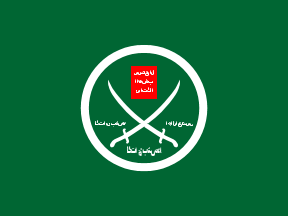
Karim realized that violent acts, embraced only out of necessity and even then reluctantly, weren’t going to bring down the regime. Rather, the objective was to establish “red lines” and to “reach” members of the regime who were oblivious to the consequences of their actions. The example raised by Karim, echoed by many others I spoke to, was perhaps the most obvious one, as it captured the indignity, outrage, and horror of Muslim Brotherhood members: that of a police officer who raped a sister (“ sister” here being either literal or figurative or both).
“If there’s a person known to take girls and sexually assault them, find out where he lives and then torch his car,” Karim told me. “Leave a message not to do it ever again; otherwise, the punishments will be more serious.” Beyond the burning of police cars and the targeting of security personnel, Muslim Brotherhood youth were asking themselves what next. Beyond supposedly serving as deterrents against future police brutality, what was this sort of low- level, anarchic violence meant to accomplish?
To answer such a question, more systematic thinking was required, and so Karim walked me through his thought process. “What are the elements that strengthen or weaken the coup?” he asked me rhetorically. “That’s what we have to think about.”
Shadi Hamid is a senior fellow in the Center for Middle East Policy at the Brookings Institution and a contributing writer for The Atlantic. An expert on Islamist movements, he previously served as director of research at the Brookings Doha Center. His first book Temptations of Power: Islamists and Illiberal Democracy in a New Middle East was named a Foreign Affairs Best Book of 2014. Hamid lives in Washington, D.C.
